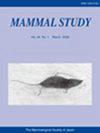乡村景观中野猪的栖息范围及生境选择
IF 0.8
4区 生物学
Q3 ZOOLOGY
引用次数: 2
摘要
摘要野猪会对农作物造成损害,是引起传染病的媒介。因此,人口管理对于减轻损失至关重要。由于栖息地范围和栖息地选择对目标物种的管理非常重要,准确的空间数据将为制定种群管理方案提供有价值的信息。在本研究中,我们调查了野猪的生活范围和栖息地选择,旨在帮助实施有效的种群管理。2020年10月至2022年6月,我们在日本岐阜县中部捕获了7只野猪,并对每只进行了监测。我们计算了家庭范围的大小,并调查了白天和晚上的环境特征。根据最小凸多边形法估计的归属范围大小在0.32至28.51平方公里之间。此外,野猪在白天避开人为环境,在夜间选择性地使用农田。因此,根据人类活动环境的不同,野猪的活动范围很窄。因此,野生动物管理者可以通过管理农村景观中的竹林和废弃耕地来减少野猪对农业的破坏。此外,对于传染病,他们应该在传染病流行地区周围实施针对野猪的对策。本文章由计算机程序翻译,如有差异,请以英文原文为准。
Home Range and Habitat Selection of Wild Boar (Sus scrofa) in Rural Landscape
Abstract. Wild boars can cause crop damage and are vectors causing infectious diseases. Thus, population management is essential to mitigate the damage. Because home range and habitat selection is important for the management of target species, accurate spatial data would provide valuable information to establish population management scheme. In this study, we investigated the home range and habitat selection of wild boars and aimed to help implement effective population management. We captured seven wild boars in central Gifu Prefecture, Japan, and monitored each individual from October 2020 to June 2022. We calculated the home range size and investigated environmental characteristics during daytime and nighttime. The home range sizes estimated from the minimum convex polygon method ranged from 0.32 to 28.51 km2. Moreover, wild boars avoided anthropogenic environments during the daytime and selectively used areas in the cropland category during the nighttime. Therefore, wild boars had narrow home ranges depending on the anthropogenic environments. Consequently, wildlife managers could reduce agricultural damage caused by wild boars by managing bamboo forests and abandoned cultivated lands in the rural landscape. For infectious diseases, moreover, they should implement countermeasures against wild boars around areas where infectious diseases are endemic.
求助全文
通过发布文献求助,成功后即可免费获取论文全文。
去求助
来源期刊

Mammal Study
ZOOLOGY-
CiteScore
1.70
自引率
20.00%
发文量
23
审稿时长
>12 weeks
期刊介绍:
Mammal Study is the official journal of the Mammal Society of Japan. It publishes original articles, short communications, and reviews on all aspects of mammalogy quarterly, written in English.
 求助内容:
求助内容: 应助结果提醒方式:
应助结果提醒方式:


